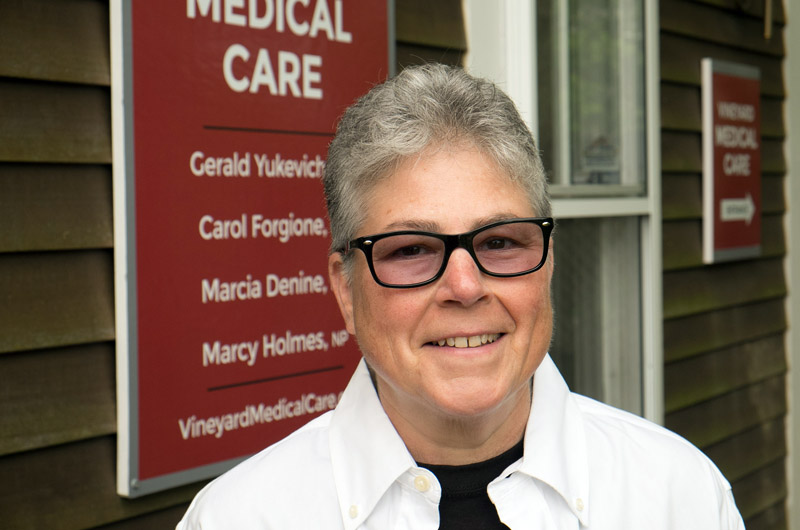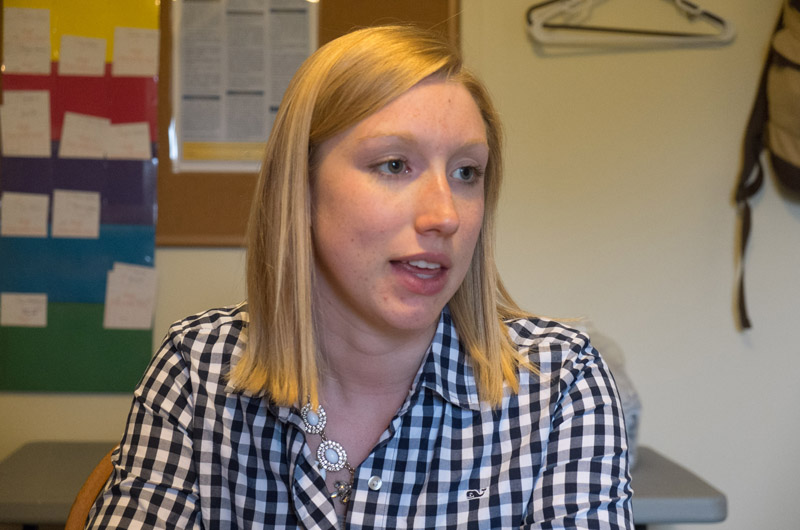In just over half a year, the Vineyard Center for Clinical Research has completed its first trial and has begun working on three others that are aimed at improving the diagnosis of Lyme disease.
The center operates out of the Vineyard Medical Care building in Vineyard Haven, and relies mostly on center staff members. Lena Prisco, who co-founded the center last fall along with medical center director and owner Michael Loberg, said the idea was to focus on Lyme disease and other diseases that are common on the Vineyard.
Ms. Prisco said cases of Lyme disease are vastly under reported, in large part because the only official diagnosis — a red bull’s eye rash at the point of infection — appears in fewer than half of all cases. Even people with a rash may not have produced enough antibodies for a positive diagnosis.
“The current methods, although they are very specific, they can tend to be insensitive because they depend on an immune response which is variable from person to person,” Ms. Prisco said in an interview this week. “Then it leads to either false negatives or false
positives. The danger obviously in this case is a false negative,” she added.
All three trials rely on volunteer patients who have been diagnosed with Lyme disease. More than 20 patients have signed up so far, and more are expected this summer as the number of cases on the Island increases. Most volunteers receive a stipend of $50 or $100 over the course of the trial.
An initial study using frozen samples to compare two diagnostic techniques has already been completed. Ms. Prisco will present the results at a national conference in Atlanta next month. The results may allow for faster diagnosis without having to send antibody samples to larger clinics for additional testing.
This winter, the center joined a trial by Oxford Immunotec, a global diagnostics company based in Marlborough. The study looks at the response of certain types of white blood cells known as T-cells, rather than antibodies, as an indicator of Lyme disease. Alix Emden, one of two interns working at the center this summer, said that approach “is go
ing to make it a more effective test, for faster results and less ambiguity.” One goal of the study is to develop an FDA-approved Lyme disease testing kit for hospitals. The trial will likely end this fall.
Anna McGlade, another intern working in the lab this summer, added that while antibodies can stay in the body for up to five years, T-cells have a more immediate response to the disease. “So you would be able to determine new infection versus the effects of long-term infection,” she said.
The trial itself required FDA approval and looks only at patients who exhibit the bull’s eye rash. Mr. Loberg, a Vineyard Haven resident who took ownership of the medical center last year, said he expects the trial to prove 100 per cent effective for diagnosing those patients. “Then the real question is, other people who we’ve diagnosed with Lyme disease — that they show positive too,” he said.
He said the Oxford Immunotec trial could revolutionize Lyme disease diagnosis. Vineyard Medical Center was eager to participate in the study, and Oxford Immunotec was drawn to the high incidence of Lyme disease on the Island and the center’s ability to run reliable tests, Mr. Loberg said. As of Tuesday, 11 patients were participating in the study.
In May the center began collecting samples for a Lyme disease repository funded in part by the Bay Area Lyme Foundation in Portola Valley, Calif. Repositories, or bio-banks, are common for many diseases, but not Lyme disease, Ms. Prisco said. She added that the bio-bank will likely be the center’s most expensive undertaking so far, since it is ongoing. Samples are sent to a certified specimen storage facility in Maryland for researchers to access after an application process.
A third trial that started last week will look at a range of cell types and responses that occur in an acute Lyme infection. That study, in conjunction with Stanford University, will likely continue for five years, in part because it also is limited to patients who present a rash.
All the clinics participating in the three trials will share their data and other results, Ms. Prisco said. She said she will be attempting to grow Lyme bacteria at the center this summer. “It’s notoriously hard to grow,” she said. “For whatever reason it doesn’t seem to survive well in culture methods.”
A small laboratory about the size of a kitchen pantry at the Vineyard Medical Center building houses the several machines that prepare the blood samples and run the tests. On Monday, a small machine hummed quietly as it rocked two vials of blood to prevent clotting.
“We are doing tons of stuff out of a very small space,” Mr. Loberg said, adding that eventually the space will need to expand. “Right now we can make it work by opening up [the clinic] on Saturdays and increasing our hours during the day.”
One goal of the center is to provide job experience for young people on the Island. Mr. Loberg said the medical center has begun training high school students in drawing blood and handling lab samples. With the right kind of fundraising, he said, the center could offer some year-round employment.
But Lyme disease research is mostly seasonal. Alzheimer’s or multiple sclerosis studies would be year-round, and would likely necessitate additional staff, said Ms. Prisco, who hopes to begin a trial looking at Alzheimer’s disease this year.
The center also aims to provide a new funding source for the Islandwide tick-borne illness reduction initiative, which began in 2000. A five-year grant administered by the Martha’s Vineyard Regional Hospital to fund the initiative ends this year. But the center plans to keep those efforts alive through grants and donations. Lyme disease is the most common tick-borne illness.
The initiative includes school programs, a web page and a series of educational videos, along with a free yard-assessment program in Chilmark and Chappaquiddick — two hot spots for ticks on the Island — to help people reduce tick habitat on their property.









Comments (4)
Comments
Comment policy »